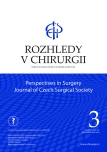-
Medical journals
- Career
Risk of biochemical recurrence in patients with a positive surgical margin after radical prostatectomy
Authors: T. Zdobinská; L. Jarolím; V. Novák; J. Do Carmo; O. Příman; Š. Veselý; M. Babjuk
Authors‘ workplace: Urologická klinika 2. lékařská fakulta a Fakultní nemocnice v Motole, Praha
Published in: Rozhl. Chir., 2022, roč. 101, č. 3, s. 129-133.
Category: Original articles
doi: https://doi.org/10.33699/PIS.2022.101.3.129–133Overview
Introduction: Serum prostate specific antigen (PSA) is an irreplaceable marker in the detection and follow-up of patients with prostate cancer. In our analysis we addressed factors that could indicate the likelihood of biochemical recurrence (BCR) early after radical prostatectomy. We mainly focused on the positive surgical margin (R1).
Methods: Retrospective evaluation and analysis of the database of patients with prostate cancer after radical prostatectomy from 2001 to 2019. In total 1529 patients were enrolled in the study. The median follow-up was 48 months. The age of the patients ranged from 49 to 76 years. We used pre-operative PSA values, and the monitoring of the dynamics of 3rd generation PSA progression (detection limit 0.003 ng/ml) at month 1 and month 3 after surgery and then in 3-month intervals. We monitored the surgical margin positivity (R0 negative, R1 positive) and the Gleason score (GS) based on histological samples and we analysed the relationship to biochemical recurrence of the disease.
Results: The pre-operative PSA value did not show a direct relationship to the R1 risk. Patient values in the groups R1 and R0 differed only by 1.159 ng/ml (p=NS). The 3rd generation PSA value at month 1 after surgery was 50.82% higher in R1 patients (p>0.001). 50% of patients with R1 (29.5% patients of the total) did develop BCR during the follow-up period, while in patients with R0 (70.5% patients of the total) this proportion was 30% (p>0.001). Among those with GS 6−7, 47% developed BCR. The GS 8−10 group relapsed in 75% of the cases (p>0.001).
Conclusion: According to our analysis 33% of the patients reached the stage of biochemical recurrence. We demonstrated a direct dependency between the risk of recurrence and the final Gleason score. The presence of R1 should not be viewed as a direct indication for adjuvant radiotherapy.
Keywords:
Radical prostatectomy – positive surgical margin – biochemical recurrence
Sources
1 Vesely S, Jarolim L, Duskova K, et al. The use of early postoperative prostate-specific antigen to stratify risk in patients with positive surgical margins after radical prostatectomy. BMC Urology [online]. 2014;14(1). doi:10.1186/1471-2490-14-79.
2 Bott SRJ, Kirby RJ, et al. Avoidance and management of positive surgical margins before, during and after radical prostatectomy. Prostate Cancer and Prostatic Diseases [online]. 2002;5(4):252−263. doi:10.1038/sj.pcan.4500612.
3 Boorijan S, Tollefson M, Rangel L, et al. Clinicopathological predictors of systemic progression and prostate cancer mortality in patients with a positive surgical margin at radical prostatectomy. Prostate Cancer Prostatic Dis. 2012;15 : 56–62. doi:10.1038/pcan.2011.36.
4 Van der Kwast TH, Bolla M, Van Poppel H, et al. Identification of patients with prostate cancer who benefit from immediate postoperative radiotherapy: EORTC 22911. Journal of Clinical Oncology [online]. 2016;25(27):4178−4186. doi:10.1200/JCO.2006.10.4067.
5 Chen WM, Yang CR, Ou YC, et al. Clinical outcome of patients with stage T1a prostate cancer. J Chin Med Assoc. 2003 Apr;66(4):236−240.
6 Budäus L, Isbarn H, Eichelberg Ch, et al. Biochemical recurrence after radical prostatectomy: Multiplicative interaction between surgical margin status and pathological stage. Journal of Urology [online]. 2010;184(4):1341−1346. doi:10.1016/j.juro.2010.06.018.
7 Huri E, Aydogmus Z, Doluoglu OG, et al. Effect of positive surgical margins on biochemical failure, biochemical recurrence - free survival, and overall survival after radical prostatectomy: Median long-term results. The Kaohsiung Journal of Medical Sciences [online]. 2014;30(10):510−514. doi:10.1016/j. kjms.2014.04.001.
8 Xiang C, Liu X, Chen S, et al. Prediction of biochemical recurrence following radiotherapy among patients with persistent PSA after radical prostatectomy: A single-center experience. Urologia Internationalis [online]. 2018;101(1):47−55. doi:10.1159/000488536.
9 Eminaga O, Hinkelammert R, Titze U, et al. The presence of positive surgical margins in patients with organ-confined prostate cancer results in biochemical recurrence at a similar rate to that in patients with extracapsular extension and PSA≤10ng/ml. Urologic oncology: Seminars and original investigations [online]. 2014;32(1):e17-32.e25. doi:10.1016/j.urolonc. 2012.11.021.
10 Pfitzenmaier J, Pahernik S, Tremmel T, et al. Positive surgical margins after radical prostatectomy: do they have an impact on biochemical or clinical progression? BJU Int. 2008 Nov;102(10):1413−1418. doi:10.1111/j.1464-410X.2008.07791.x.
11 Tallman JE, Vignesh T. Packiam KE, et al. Influence of pathologist experience on positive surgical margins following radical prostatectomy. Urologic Oncology: Seminars and Original Investigations [online]. 2017;35(7):461.e1−461.e6. doi:10.1016/j.urolonc.2017.02.007.
12 Fouad A, Albisinni S, Henriet B, et al. Predictive factors associated with biochemical recurrence following radical prostatectomy for pathological T2 prostate cancer with negative surgical margins. Scandinavian Journal of Urology 2016;51(1):20−26. doi:10.1080/21681805 .2016.1263237.
Labels
Surgery Orthopaedics Trauma surgery
Article was published inPerspectives in Surgery

2022 Issue 3-
All articles in this issue
- Vybrané aspekty současné onkourologie
- New trends in prostate cancer diagnostics
- Management of BCG failure in non-muscle-invasive bladder cancer − the present and the future
- Histologic tumor necrosis rate as a predictor of recurrence after surgical treatment for localized clear cell renal cell carcinoma
- Prognostic factors of early second transurethral resection of non-muscle invasive bladder cancer − 10 years of experience of a referral center
- Risk of biochemical recurrence in patients with a positive surgical margin after radical prostatectomy
- Penile amputation for sarcoma
- Occult breast cancer: a case report and current management of treatment
- Perspectives in Surgery
- Journal archive
- Current issue
- Online only
- About the journal
Most read in this issue- Risk of biochemical recurrence in patients with a positive surgical margin after radical prostatectomy
- New trends in prostate cancer diagnostics
- Occult breast cancer: a case report and current management of treatment
- Penile amputation for sarcoma
Login#ADS_BOTTOM_SCRIPTS#Forgotten passwordEnter the email address that you registered with. We will send you instructions on how to set a new password.
- Career

